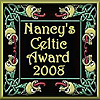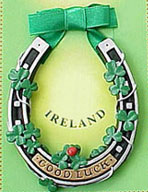| |

Traditions, folklore, history and more. If it's Irish, it's here. Or will be!
"People will not look forward to posterity who never look backward to their ancestors."
-Edmund Burke




Quotes
Library: Books, Movies, Music
Prints & Photos
Poetry
Jokes


Shops Ireland
Bunús na Gaeilge
(Basic Irish)
Circle of Prayer
Blessings
Did You Know?
Himself/Herself
Write to Us
Readers Write..
Links/Link to Us
Advertise with us
Awards & Testimonials
Submissions Guide


|
|
|
God Between us and All Harm - Irish Superstitions
by Bridget Haggerty

In all my years, I've never met a more superstitious person than my Dublin-born mother, Lena O'Flaherty. It was bad luck to put shoes on a table or chair, place a bed facing the door, bring lilac into the house, cut your fingernails on Sunday, give a knife as a gift, or wear green - except for a bit of Shamrock or ribbon on St. Patrick's Day.
My mother grew up in a land that's renowned for its belief in superstitions, and while Ireland has become a very modern country, it's safe to say that many of her inhabitants, as well those of Irish descent living elsewhere, still throw spilled salt over their right shoulder or worry about seven years bad luck if they break a mirror. No doubt, you can add a dozen more to your own personal list, but we're going to relate some odd ones you may never have heard of before.
Did you know, for example, that you can tame a young wild horse by whispering the Creed into his left ear on Wednesday and into his right ear on Friday? The procedure was repeated until the animal was calmed.
If a bird flew into the house, it was a portent of death. A purse made from a weasel would never be empty. It was unlucky to knit at night until you were certain the sheep were asleep. It was fortunate to hear a cuckoo call - but only if it was on your right side. If a child was born before noon, he or she would not be able to see spirits or the good people - but if born at night, the child would have the gift. By the way, it's considered very risky to refer to the good people as fairies, wee folk or little people.
Thinking of building an extension onto your home? It's supposed to be unlucky to extend from the rear - especially if it faces west. This belief probably originated on the Aran Isles where they were reluctant to build in that direction - no doubt, because of the weather. As the story goes, one family defied the custom with tragic results - two of their menfolk were lost at sea and a third went mad.
Livestock fairs are still widespread in Ireland and it's common practise to give a "luck penny" which means returning a portion of the sale price to the seller when a deal is made. The deal is then settled by spitting on the palm and slapping the hand of the customer. Interestingly, a man's status in the area is often determined by the size of the "luck penny" he is in the habit of giving.
From the country folk come a wealth of beliefs related to physical ailments. For example, a stocking filled with hot potatoes and applied to the throat cured tonsillitis. Shaving on Sunday encouraged toothache - but carrying a haddock's jawbone helped prevent it. Boiled daisies were said to relieve sore eyes, milk in which kelp had been boiled could cure boils, and unsalted butter rubbed on a stitch in the side could make it go away. As for warts, my mother firmly believed they could be cured by rubbing them with a fresh-cut potato and burying the potato in the garden. As I recall, I don't remember my brothers or I suffering from this particular affliction, so I can't attest to the efficacy of this cure.
Still more colorful superstitions surround the sea and the weather. Changing the name of a boat was said to change its luck and coins dropped overboard would cause a storm. Fishermen considered it unlucky to keep the first salmon of the season. Inishowen anglers were reluctant to paint their boats green; taking short-cuts from established routes along the shore was unlucky, and water in the house - not just in coastal areas - had many superstitions attached to it. For example, water in which feet were washed was never thrown out at night. And, when water was discarded, it was never thrown without a warning to the good people.
As for the weather, because they depended so much on a fruitful harvest, rural folk paid close attention to the portents. The old, familiar red sky at night rhyme was common in the Irish country side - but so were other signs including falling soot, frogs changing color, curlews calling, midges biting, and swallows flying low. All of these omens foretold a change for good or ill. Seafolk had their own superstitions, too. Big shoals of herring foretold a plentiful harvest; three boats were lashed together when leaving a harbor because it was bad luck to be the third boat out; along the northwest coast, some of the catch was always left on board; sharks should not be hunted on Sunday; no family called Cregan or Kerry would ever be drowned; greedy pollock were a sign of bad weather; a coal thrown after a fisherman as he board his boat brought good luck and he always boarded from the right; and, in Wicklow, the fishermen always put to sea in a sunwise direction. There's some logic to many of these beliefs - especially those regarding the movement of marine life or birds. Porpoises swimming near shore, lobster and crabs on rocks, or seagulls and other sea-birds flying in-land were all portents of stormy weather.
To live through an ordinary day in old Ireland without being mindful of so many superstitions would have been impossible. Add to this burden, the special beliefs surrounding important dates in the calendar.
Pipes were never lit from the hearth fire on May Day, nor were the embers taken outdoors. Also, if you drank nettle soup on May 1, it was believed that you'd be free of rheumatism for a year. It was unlucky to go on a trip on both St. Martins Eve and the Feast of St. Martin - November 10 and 11. On Epiphany, January 6, the tail of a herring was rubbed across the eyes of children to protect them from disease for the rest of the year. On St. Brigid's Day, February 1, a straw from the Christmas nativity scene was put up into the rafters to protect against evil spirits (or as a cure for ringworm!) Whitsuntide was associated with drowning and there were those who would not put to sea - unless the boat was steered by a new bride. On Good Friday, while little work was done in observance of the Crucifixion, it was a lucky day to sow potatoes. And, on all Souls Day - November 2 - people avoided taking short cuts for fear the good people would lead them astray. Other days in the year had special beliefs attached to them - Saturday, in particular. In the old days, it was considered unlucky to move house, get married, begin a big project, or take a journey overnight.
"Pinch, punch, first day of the month, white rabbit!" This was a verse my mother taught us and I have no idea what it means. But my brothers and I certainly had fun putting the words into action at the beginning of every month. My mother also carried a rabbit's foot for good luck. However, in the old days, it wouldn't have been a rabbit at all. Hares are featured in numerous folktales and my very devout Catholic mother would have been dismayed to learn that the hare - and subsequently, the rabbit - is an ancient pagan symbol. When Christianity came to Ireland, the symbol of the hare was used deliberately to transfer old pagan religion into a Christian context - especially at Easter time. As harbingers of spring, hares were held in high esteem. Over time, the Easter hare became the Easter rabbit or bunny - far less threatening to Christian Ireland than the ancient pagan symbol.
Besides hares and rabbits, other animals, as well as birds, provided rich fodder for superstitious country folk. If a cat strayed into a house, every effort was made to make it stay. But, if a family moved, the cat was left behind. It was also believed that you should not look at a cat who had just wiped its face with its paws - whoever the cat looked at would be the first in the household to die. Crows flying directly over a home were also an omen of death and the old Irish saying "God between us and all harm" was always said on hearing the crow of a rooster - no doubt, a throwback to the betrayal of Jesus in the garden of Gethsemane.
There are literally hundreds of other fascinating beliefs - so many in fact, that we have enough material for several articles. So, we'll conclude this one with a few more and then save the rest for future reading. Also, Russ wants to do a spoof on the subject - perhaps this public announcement will help encourage him!
Besides the rabbit's foot my mother carried with her from Ireland, she also had a lucky horseshoe - a real one - positioned above the door into our flat. It was placed with the points up "so the luck wouldn't run out." Even today, Irish brides make sure there's a lucky horseshoe included in their ensemble - perhaps a small fabric one sewn into the hem of their gown or a fabric one carried on their wrist (as our daughter did). Growing up in my mother's house in 1950s London, England, we were spared many of the old ways that would have been common in the rural Ireland of Lena O'Flaherty's childhood. If you've often wondered why Irish children were often seen as barefoot and scruffy, did you know that it was to protect them from the good people? Beautiful things, including children, were a much sought after treasure, so Irish mothers in the old days made certain their offspring looked as unattractive as possible. My mother was also adamant about never saying how cute a baby was. That was definitely tempting the fates - as was admiring a piece of jewelry. That would "bring down the evil eye."
Just as in old Ireland, not a day goes by without being reminded of my mother's beliefs. But, while I can now walk under a ladder and scorn the very logical origins of perhaps being showered with paint, I still won't allow an open umbrella in the house. Or lilac blooms inside. Or crossed knives on the countertop - better uncross them immediately or there will be an argument!
Whether you believe in any of these old superstitions or not, there's no doubt that there's total truth in the old saying that if you're Irish, you're lucky enough.
Resources:
Content: Superstitions of the Irish Country People
Image: Irish Tinker.
|
|
Fri, Sep 27, 2024
 The Galway Hooker The Galway Hooker
This unique vessel, with its distinctive curved lines and bright red sails, originated in the village of Claddagh. During the 19th century, hookers supported a significant fishing industry and also carried goods, livestock and fuel. Seán Rainey is remembered for building the last of the original boats, the Truelight, for Martin Oliver who was to become the last king of the Claddagh; as king, he was entitled to white sails on his boat. Since the mid seventies, many of the old sailing craft which were on the verge of extinction have been lovingly restored and new ones have been built. During the summer months they can be seen at festivals such a Cruinniú na mBád - the Gathering of the Boats - in Kinvara.
Click for More Culture Corner.
Whether you are Irish by blood, or just wish you were, A Treasury of Irish Folklore is the book for you. Everything from Irish myths, superstitions, and even songs of Ireland are included. From blessings, to spells, this book is chocked full of info... Amazon Reviewer
We have this and it is everything you may want
Click for Irish Folklore.
|
More than 100 years ago, Lady Wilde, mother of famed author Oscar Wilde, put together this fascinating collection of archaic cures, ancient spells, homespun proverbs, visionary omens and enlightening prophecies.
Click here for Irish Cures, Mystic Charms & Superstitions
|
|
|
|
|




 The Galway Hooker
The Galway Hooker